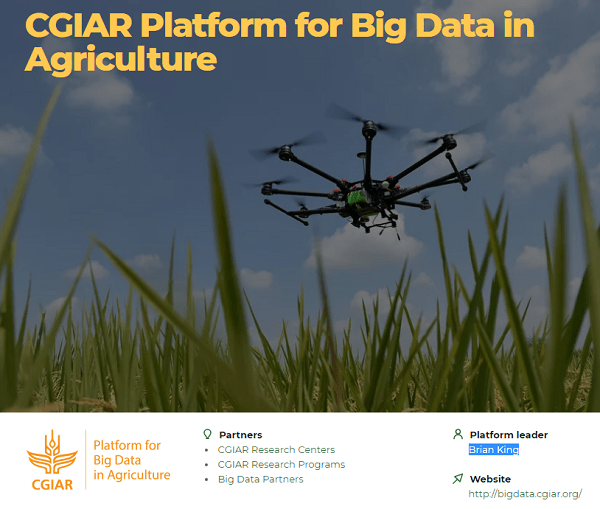Q&A between FAO AIMS and Platform Coordinator Brian King
The BIG DATA Platform’s Coordinator Brian King spoke with the Agricultural Information Management Standards team facilitated by the Food and Agriculture Organization of the United Nations.
***
The FAO AIMS team caught up with Brian King, who is the Coordinator of the CGIAR Platform for Big Data in Agriculture. We asked him a few questions on the CGIAR Platform for Big Data in Agriculture. Please follow the interview below.
AIMS: Could you tell us briefly about yourself and the work you do on the CGIAR Platform for Big Data in Agriculture?
Brian: I lead the CGIAR Platform for Big Data in Agriculture. We aim to turn the research data generated by the global CGIAR consortium into new data-driven capabilities for our organization and the sector. It’s about big-data enabling the agriculture development enterprise.
AIMS: What is the CGIAR Platform for Big Data in Agriculture and why it was established?
Brian: CGIAR launched the Big Data Platform in 2017 as a five-year initiative to coalesce the global, data-driven capabilities of CGIAR to both leverage and shape the digital transformations happening in our sector.
Big data in agriculture represents an unprecedented opportunity to find new ways of reducing hunger and poverty.
By applying data-driven solutions to ongoing research for development impact, we aim to become more skilful data stewards, build new alliances, and develop innovation strategies for digital agriculture.
AIMS: Agricultural data is often lost in the data cycle, how does the CGIAR Platform support the data generation, access and management within CGIAR and its external partners?
Brian: Very true that data gets lost. In the context of CGIAR we have invested in open repositories for data and publications, and under the Platform we helped finalize and promote the adoption of common metadata standards.
But these are only the first steps, as the real change is a matter of culture, getting individual researchers to see the value of data exchange for accelerating research.
We aim to demonstrate some the power of this through GARDIAN, the first pan-CGIAR data discoverability portal.
GARDIAN automatically indexes data that appear in open repositories across our 15 Centers, 12 global research programs, and 11 genebanks, making them keyword searchable.
CGIAR centers have published a cumulative 96,175 publications and 2,852 well-described data sets in GARDIAN to date, and this is of course only scratching the surface.
We have a number of cool features on the development site including: pipelines to bring data directly into models and analytic environments, machine learning-aided detection of personally identifiable information that may appear in datasets, and tools for easing data annotation.
AIMS: One of the key aspects of opening up data and making it available is to spur innovations and democratize big data opportunities. How has the CGIAR encouraged the use of this and other data sets to encourage innovations?
Brian: The Platform runs an innovation process called the Inspire Challenge where we challenge CGIAR researchers’ organizations to partner with industry and leverage public good data, especially CGIAR data, to solve intractable agricultural challenges.
Projects range from deploying the in-field gene sequencers used for Ebola diagnosis to detect devastating wheat rust, to integrating cellphone camera imagery into the workflow of a bundled insurance and advisory service.
We have awarded a total of $1.5 Million in grant funding to date. The 2019 round of the Challenge is open right now–go take a look.
AIMS: Could you recount for use, the most notable immediate outcomes or impact of the Big Data Platform?
Brian: We can see measurable shifts in data sharing behaviours across our organization and we think we are leveraging our network of partners to begin to both leverage and shape trends in digital agriculture for development.
We see it in an uptick in data sharing, and also in a new priority being given to digital transformation in our organization overall.
We are also pleased to see that a few of the awardees under our Inspire Challenge are generating great new evidence and potential for even greater impact.
AIMS: What does the future hold for the Platform? And what are the planned activities?
Brian: Our goal is to drive down the cost of innovation and bridge the gaps among different types of knowledge, sectors, and approaches.
We want to inspire more proactive links between agriculture researchers and innovators and apply them in new ways, in real time, from the local to the global.
The Inspire Challenge awards will be announced at the third Big Data in Agriculture Convention in Hyderabad, India, 16-18 October 2019.
The theme this year is Trust: Humans, Machines & Ecosystems. We aim to make this about how digital technologies can be part of holistic solutions for food security, and the special role of trust in making those solutions viable.
AIMS : Thank you very much for your time and shedding more information on the CGIAR Platform for Big Data.
May 24, 2019
Brian King
Platform Coordinator
CGIAR Platform for Big Data in Agriculture
Cali, Colombia
Latest news





